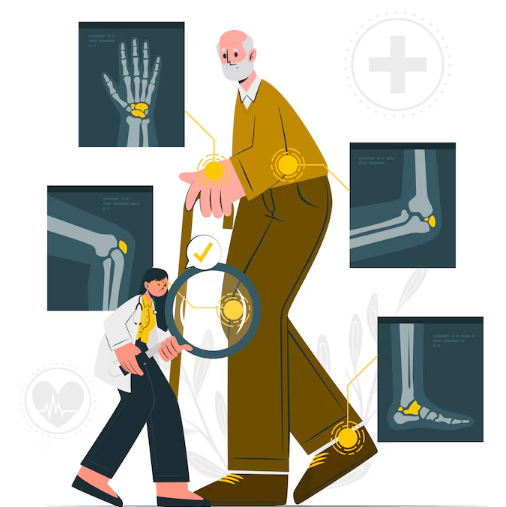Orthopaedic disorders affect the parts of our body that help us move. This includes bones, joints, and more. They can happen because of age, an injury, or even if it runs in your family. It’s important to know about the causes, signs, and ways to treat these disorders. This knowledge can help keep our joints healthy.
These disorders show up in different ways. You might feel pain, find it hard to move, or your joints may swell. These issues can make everyday life tough. But, there’s good news. Many treatments can help. From taking medicines to doing special exercises, there’s a lot you can do. Sometimes, doctors might need to do surgery. This can help fix the problem and make you feel better.
To keep your joints in good shape, prevention is key. Start by exercising regularly and keeping a healthy weight. Use your body the right way to avoid putting too much pressure on your joints. Also, be careful when you’re active. Try to avoid doing the same motion over and over. This can hurt your joints in the long run and can cause serious injury in such a situation you have to run to the best orthopedic hospital in Jaipur for treatment to Keep your body healthy and pain-free.
Common Orthopedic Disorders and their Treatments
Orthopaedic disorders cover many problems affecting bones, joints, and muscles. They lead to symptoms like joint or back pain, and sometimes fractures. Treatments vary depending on the condition and how serious it is.
First, doctors try less invasive methods. This includes pain medicines, physical therapy, and changing how you live to protect your joints. These steps help a lot with arthritis and similar issues.
Sometimes, surgeries are needed, especially for severe cases. For example, in total joint replacement, a doctor replaces a damaged joint with a new one. For certain injuries, like in the shoulder or knee, scopes and small cuts are used to fix the problem. Serious fractures might need surgery to ensure they heal well.
Other times, bone grafts are needed to repair missing or damaged bones. This surgery helps new bone to grow. Spinal fusion is another example, which connects vertebrae to fight back pain from different conditions.
“Orthopedic disorders can greatly affect how you live. The right treatment depends on how bad the issue is. Always listen to a doctor for the best advice.”
Most often, a mix of methods is used to tackle orthopaedic issues. It’s key to see a skilled specialist. They can figure out the best treatment plan just for you, based on your situation and needs.
Table of Contents
Orthopedic Specialists and Diagnosis Process
Orthopaedic specialists focus on musculoskeletal issues. They diagnose and treat problems with bones, joints, and more. Their work helps people with injuries or conditions that affect movement.
They use a mix of surgery and non-surgery to understand problems. First, they do a detailed check-up. This looks at how well you can move, your joint strength, and overall body health. They also ask about your health history, including past injuries.
Different types of images, like X-rays, are key tools for them. These show inside your body. They help find any broken bones or other issues. They might order an MRI or CT scan if they need even more details.
Orthopaedic specialists aim for the best diagnosis to pick the right treatment. Dr Elizabeth Anderson says tests like X-rays are vital. They help figure out what’s going on in your body and plan the best care.
Combining exams, health history, and imaging helps orthopaedic specialists know what’s wrong. This leads to treatment plans matched to each patient. They pick care options that best fit your needs.
Conclusion
Orthopaedic disorders are common and can greatly affect life quality. Knowing the causes, symptoms, and treatments is key. Specialists work to reduce pain, enhance movement, and better joint health.
To avoid these problems, take steps early and see a doctor promptly. It’s important to keep your joints healthy with exercise, staying at a good weight, and using your body right. These steps help avoid injuries, slow illness, and keep joints strong.
Do you or someone you know have orthopaedic disorder signs like constant joint pain or swelling? Seeing an orthopaedic surgeon soon is important, you can find an orthopedic surgeon in Jaipur at ML Center Jaipur. Early treatment can make a big difference and lead to better long-term results. Caring for your bones and joints is essential for an energetic and happy life.
FAQs:
Q1: What are orthopaedic disorders?
Ans: Orthopaedic disorders affect the body’s musculoskeletal system. This includes bones, joints, muscles, and more.
Q2: What causes orthopaedic disorders?
Ans: Many things can cause orthopaedic disorders. These include getting older, having injuries, or genetic factors.
Q3: What are the treatment options for orthopaedic disorders?
Ans: There are several treatments for orthopaedic problems. These can range from taking medicine to having surgery.
Q4: How are orthopaedic disorders diagnosed?
Ans: Doctors first do a detailed physical check and look at your medical history. They might also use X-rays for a closer look.

